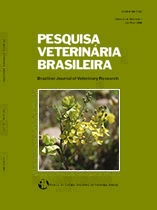 |
|
|
|
Year 2017 - Volume 37, Number 7
|

|
Caryocar brasiliense shell ethanol extract in chronic cardiotoxicity induced by doxorubicin in rats, 37(7):713-724
|
ABSTRACT.- Moura L.R., Orpinelli S.R.T., Sousa J.H., Faleiro M.B.R., Conceição E.C., Sugita D.M., Beletti M.E. & Moura V.M.B.D. 2017. [Caryocar brasiliense shell ethanol extract in chronic cardiotoxicity induced by doxorubicin in rats.] Ação do extrato etanólico da casca do pequi (Caryocar brasiliense) na cardiotoxicidade crônica induzida por doxorrubicina em ratos. Pesquisa Veterinária Brasileira 37(7):713-724. Departamento de Medicina Veterinária, Faculdade de Medicina Veterinária e Zootecnia, Universidade Federal de Goiás, Cx. Postal 131, Goiânia, GO 74001-970, Brazil. E-mail: vdmoura@hotmail.com
Doxorubicin (DOX) is a chemotherapic drug used in the treatment of malignancies, but has the cardiotoxicity as collateral effect. The objective of this study was to evaluate the action of pequi shell etanolic extract (Caryocar brasiliense) (PSEE) through morphological evaluation (macroscopic, microscopic and ultramicroscopic), and to evaluate the expression of metalloproteinases (MMP2 and MMP9) and its tissue inhibitors (TIMP1 and TIMP2) in the myocardium of rats with chronic cardiotoxicity by DOX and treated or not with PSEE. The experiment lasted three months and 30 Wistar rats were divided into six groups of five animals. G1 and G2 received 300mg/kg and 600mg/kg of PSEE, respectively, as pretreatment, by gavage for seven days and continued treatment for 21 days of application of DOX. In G1, G2, G3, G4 and GC, cardiotoxicity was induced with weekly applications of 2mg/kg DOX, intraperitoneally, totaling four applications (8 mg/kg), and in the Sham group (GS) 1ml of saline solution was applied. G3 animals received daily 300mg/kg of PSEE, and G4, 600mg/kg, by gavage, for 21 days of application of DOX. The GC and GS received 1ml of water daily by gavage also. After the completion of the application, the animals were kept for two months, with three months of experiment. Macroscopic evaluation was performed after 90 days, at which time samples were taken for analysis in electron microscopy, histopathology and immunohistochemistry. At necropsy, ascites was observed in animals that received DOX. There was a low mortality rate (3.33%), being one mouse that developed false road pneumonia. There was no change in weights and measures of the rat hearts. At doses of 300 and 600mg/kg, the PSEE attenuates myocyte vacuolar degeneration. At a dose of 600mg/kg, PSEE reduces amount Anitschkow cells. There was no significant result on the immunostaining of MMP, but considering their inhibitors (TIMP) there was a greater immunostaining of TIMP2 in GC, the group that received only DOX. It was concluded that PSEE is effective in minimizing effects of chronic cardiotoxicity induced by DOX in the myocardium of rats, whereas at doses of 300 and 600mg/kg, PSEE attenuates vacuolar degeneration in myocytes and at the dose of 600mg/kg the PSEE reduces the amount of Anitschkow cells and myofibrils fragmentation. |
| |
|
|
| |
|
 |